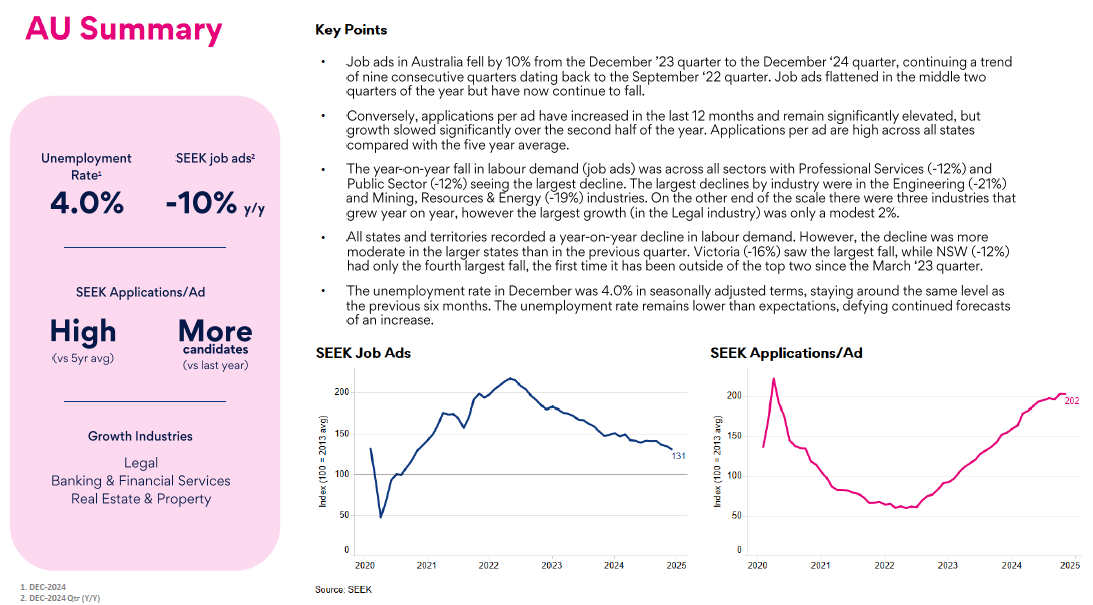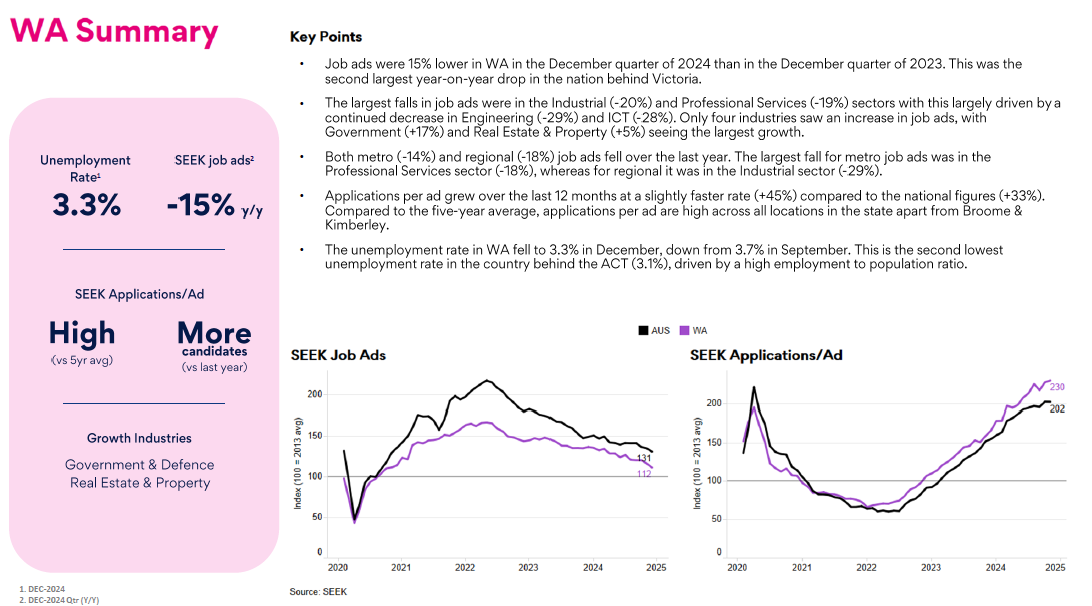Quarterly Employment Snapshot – Jan 2025
Emplyment Snapshot - January 2025: Key Insights & Trends
The latest Quarterly Employment Snapshot from SEEK offers a revealing look at workforce trends across key industries in Australia. This report provides insights into employment patterns, workforce demand, and economic factors shaping hiring trends. Below, we summarize some key findings and what they mean for job seekers and employers.

1. Employment Growth & Industry Trends
The December 2024 quarter saw notable shifts in employment figures. Whilst the number of job ads on SEEK continued to decline over the past few years and the applications per ad have increased, unemployment remains low at 4% and arguably the quality of applicants and their suitability for roles is still low. Several industries experienced growth, while others faced challenges due to economic fluctuations and sector-specific trends.
We have seen continued demand from clients in:
- Mining & Resources: Continued investment in exploration and production and increased hiring activity, particularly in Western Australia.
- Engineering & Infrastructure: Public and private infrastructure projects bolstered job creation, with strong demand for civil and structural engineers.
- Environmental Consulting: Growth in sustainability initiatives and regulatory compliance led to an uptick in hiring for environmental consultants and specialists.
- Executive Search: High-level recruitment remained stable, with demand for strategic leadership roles across multiple sectors.
We believe that skilled professionals in these industries are likely to find increased opportunities in the coming months.
2. Workforce Challenges & Skill Shortages
One of the insights from this quarter’s report is the ongoing skill shortages in specialized sectors. Companies are struggling to find experienced candidates..
For businesses, this means:
- A greater need to attract and retain talent through competitive salary offerings and career development opportunities.
- Upskilling initiatives to train employees internally to meet workforce demands.
- Flexible work arrangements to attract a broader talent pool.
For job seekers, this presents a prime opportunity to negotiate better salaries, invest in further education, and explore career advancements in high-demand areas.
3. Salary & Wage Trends
The employment snapshot indicates that salary growth remained steady across most industries, with certain high-demand roles experiencing above-average wage increases.
- Engineering and environmental roles saw modest but consistent wage growth, reflecting demand for specialized skills.
- The mining sector continued to offer competitive remuneration, particularly for roles in remote locations.
- Executive-level salaries remained strong, driven by demand for leadership talent capable of navigating economic uncertainties.
- For employers, staying competitive in salary offerings will be crucial in securing top talent. For candidates, keeping an eye on industry benchmarks can provide valuable leverage in salary negotiations.

4. Western Australia Employment Trends
Western Australia remains a key region with lower than national unemployment at just 3.3% and despite falling numbers of job adverts, still experiencing strong hiring activity, particularly in Government, Defence, Real Estate & Property as well as the resources, engineering, and environmental sectors.
- Mining Boom Continues: Increased investment in mining projects has led to higher demand for skilled professionals, particularly in exploration, site operations, and geotechnical roles.
- Infrastructure Expansion: Several large-scale infrastructure projects are driving recruitment in civil engineering, project management, and technical trades.
- Environmental & Sustainability Growth: With a focus on sustainability, there is rising demand for environmental consultants and regulatory specialists.
- Regional Opportunities: Towns like Karratha, Kalgoorlie, and Port Hedland are seeing significant hiring efforts due to the expansion of mining and infrastructure projects.
For job seekers in Western Australia, this is an excellent time to explore career opportunities in these growing industries. Employers should focus on offering competitive packages to attract and retain top talent in a competitive labor market.
5. Recruitment Outlook for 2025
Looking ahead, the employment market is expected to remain competitive as businesses adapt to economic conditions, regulatory changes, and evolving workforce expectations. Key predictions include:
- Continued demand in the resources, engineering, and environmental sectors.
- Continued hybrid work models in corporate and consulting roles.
- A greater emphasis on digital transformation and automation, requiring professionals to upskill in tech-driven roles.
- For companies, strategic workforce planning will be essential in maintaining growth, while professionals should focus on continuous learning and adaptability to stay ahead in the job market.




